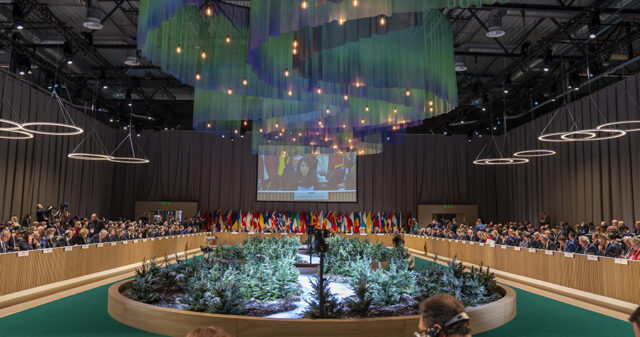
Russian-Ukrainian War Should Doom the ‘5+2’ Negotiations on Transnistria (Part Three)
Publication: Eurasia Daily Monitor Volume: 20 Issue: 18
By:

*Read Part One here.
*Read Part Two here.
The European Union has recently granted Moldova the status of candidate country for EU membership (Consilium.europa.eu, June 24, 2022). By way of consequence, the security arrangements of an EU candidate country cannot be left to an organization in which Russia plays an overbearing role, as is the case with the Organization for Security and Co-operation in Europe (OSCE) in the Transnistria conflict. Informal discussions among European diplomats from Brussels and other capitals suggest that the EU should consider stepping into this vacant function in Moldova. The Moldovan government is currently preparing a proposal to Brussels in this regard, reportedly to include an EU presence on the ground.
Similarly, with Moldova as an EU candidate, Brussels can no longer accept an inferior role to Russia’s in international negotiations over Transnistria, as has been the case in the “5+2” forum (see Part One and Part Two), in which the future of EU candidate Moldova is at stake. Assuming that the EU has drawn this consequence, it will need to coordinate with the United States (an “observer” alongside the EU in the 5+2 format) to avoid rescuing this Russian-dominated forum from its current quasi-dormancy.
Russia’s re-invasion of Ukraine and Moldova’s newly won EU candidate status make it untenable for the EU and US to continue following the OSCE’s and Russia’s lead on the Transnistria conflict. Washington and Brussels had joined the OSCE’s consensus when the latter abandoned its own resolutions about the withdrawal of Russian troops from Moldova. The EU and US also followed Russia’s and the OSCE’s lead by embracing, in the 5+2 forum and elsewhere, the concept of a “special status” for Transnistria as the basis for a political settlement. For almost 20 years, therefore, the US and collectively the EU member countries passively endorsed the OSCE’s year-end ministerial statements, which had, since 2003, dropped the call for the withdrawal of Russian troops. In recent years, the EU and US had agreed on few European issues with Russia, yet, they, nevertheless, maintained a consensus on Moldova (in tune with their “unity” in the 5+2 arrangement). Accordingly, the OSCE unanimously adopted statements calling for “a special status for Transnistria that fully guarantees the human, political, economic and social rights of the population” and “the ‘5+2’ format as the only mechanism to achieve a comprehensive and sustainable settlement” (Osce.org, December 3, 2021). Such was the wording year after year, until Russia re-invaded Ukraine in 2022, which finally scuttled that unique consensus on Moldova.
The EU, a normative organization par excellence, can no longer accept that the “human, political, economic and social rights of the population“ in EU candidate Moldova be regulated and “guaranteed” with Russia’s participation. They are, instead, to be worked out by Moldova with the EU in accordance with the EU’s norms and standards.
After some hesitation, Moldova’s leaders have at long last dropped the “special status” from their comments on a political solution in Transnistria. Notably, Foreign Minister Nicu Popescu omitted this key item from his speech to the OSCE’s year-end ministerial meeting in an organization that had embraced the concept for decades (Osce.org, December 9, 2022). The inflection point in Chisinau‘s decision is hard to pinpoint because the “special status” had faded away gradually from official statements. Any reappearance of this term in Chisinau’s discourse would be reason for concern (the Foreign Ministry was by dint of habit the slowest to abandon it). Instead, senior Moldovan officials underscore the constitution’s definition of Moldova as a “unitary state,” fully consistent with the country’s European integration. The position had until recently been that any Transnistrian “special status” must not render Moldova dysfunctional for purposes of European integration. Such had of course been Russia’s intention; and Western powers went along with this by inertia as long as Moldova was not an EU membership candidate. What is, or can become, dysfunctional is a matter for interpretation, however. Moldova can in no way put its European integration prospects at risk by negotiating a Transnistria special status with Russia and Tiraspol.
Chisinau has also advanced to calling for the complete and unconditional withdrawal of Russian forces from Moldova’s territory. It no longer differentiates between Russian “peacekeeping” troops that could remain and those troops outside the peacekeeping mission that should leave. Chisinau now considers all Russian troops without distinction as an illegal presence on Moldovan territory, one that violates Moldova’s neutrality and increases security risks. President Maia Sandu asserted this to the UN General Assembly’s autumn session and Popescu to the OSCE’s annual ministerial conference (Media.un.org, September 21, 2022; and Osce.org, December 9, 2022).
The Moldovan government has adjusted its public messaging convincingly in response to the war next door and the opening of EU membership prospects. The main tenets in Chisinau’s internal and external communications with a bearing on the Transnistria conflict include (Ziarul National, January 30):
- Moldova regards itself as belonging to the free world and is determined to integrate into it via the EU.
- Any resolution of the “dispute” [diferendul] on Transnistria shall be peaceful, democratic and European.
- Transnistria’s population shall benefit from European standards of human rights as part of the settlement.
- The demilitarization of Transnistria is a prerequisite to a political resolution, alongside democratization. (These tenets are consistent with Moldova’s 2005 law on Transnistria conflict-settlement, which bars negotiations on any political status until Russian forces withdraw from the territory.)
- New international negotiation formats and platforms are necessary to resolve the Transnistria “dispute”; they must be instituted as soon as the Russo-Ukrainian war subsides.
- Chisinau will remain in direct dialogue with Tiraspol to mitigate tensions and address economic problems in their mutual interests. (Chisinau sees itself as situated “in the same boat” with Tiraspol regarding Russian gas and electricity supplies, pending Moldova’s diversification measures.)



